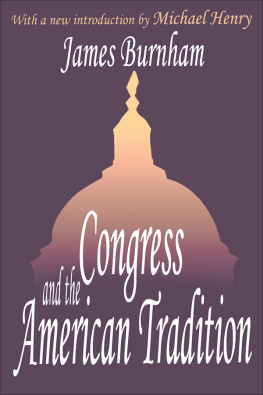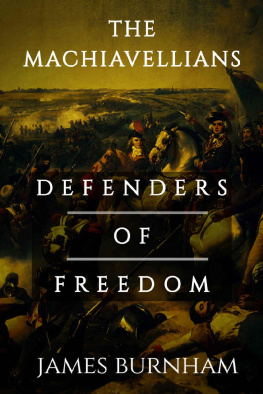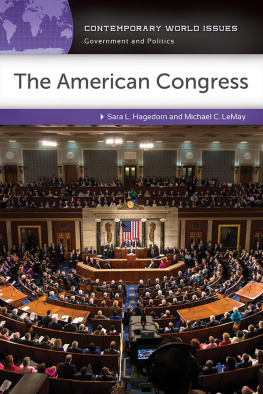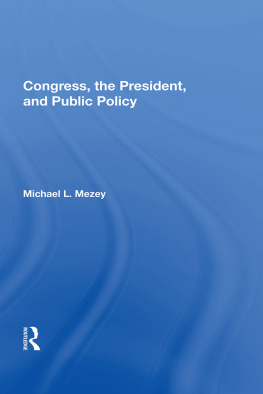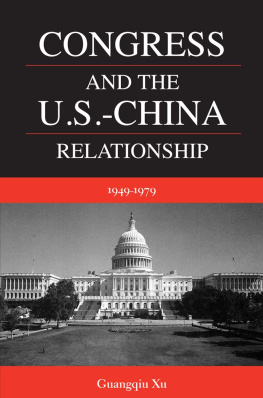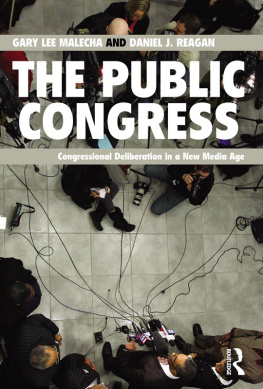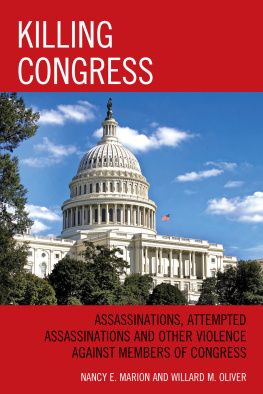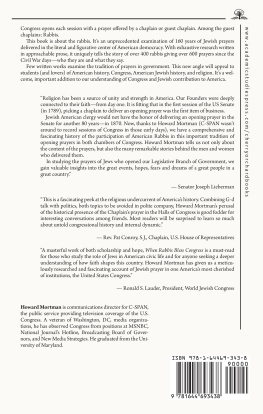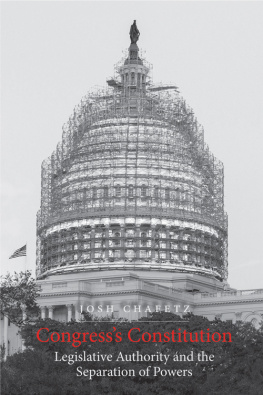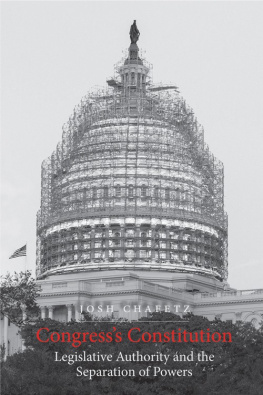Originally published in 1959 by Henry Regnery Company.
Published 2003 by Transaction Publishers
2 Park Square, Milton Park, Abingdon, Oxon 0X14 4RN
711 Third Avenue, New York, NY 10017
Routledge is an imprint of the Taylor and Francis Group, an informa business
New material this edition copyright 2003 by Taylor & Francis
All rights reserved. No part of this book may be reprinted or reproduced or utilised in any form or by any electronic, mechanical, or other means, now known or hereafter invented, including photocopying and recording, or in any information storage or retrieval system, without permission in writing from the publishers.
Notice:
Product or corporate names may be trademarks or registered trademarks, and are used only for identification and explanation without intent to infringe.
Library of Congress Catalog Number: 2002029103
Library of Congress Cataloging-in-Publication Data
Burnham, James, 1905-1987.
Congress and the American tradition / James Burnham; with an introduction by Michael Henry.
p. cm.(Library of conservative thought)
Originally published: Chicago : H. Regnery Co., 1959.
Includes bibliographical references and index.
ISBN 0-7658-0997-4 (pbk.: alk. paper)
1. United States. Congress. 2. United States. CongressPowers and duties. I. Title. II. Series.
JK1021 .B87 2003
328.73dc21 2002029103
ISBN 13: 978-0-7658-0997-1 (pbk)
Library of Conservative Thought
Americas British Culture, Kirk
Authority and the Liberal Tradition, Heineman
A Better Guide Than Reason, Bradford
Burke Street, Scott-Moncrieff
The Case for Conservatism, Wilson
Cline, Hindus
Character and Culture, Babbitt
Collected Letters of John Randolph to John Brockenbrough, Shorey
Congress and the American Tradition, Burnham
Conservatism: Dream and Reality, Nisbet
A Critical Examination of Socialism, Mallock
Edmund Burke: Appraisals & Applications, Ritchie
Edmund Burke: The Enlightenment & Revolution, Stanlis
The Essential Calhoun, Wilson
The Foundations of Political Science, Burgess
Ghosts on the Roof, Chambers
The God of the Machine, Paterson
A Historian and His World, Scott
Historical Consciousness, Lukacs
I Chose Freedom, Kravchenko
I Chose Justice, Kravchenko
Irving Babbitt, Literature, and the Democratic Culture, Hindus
The Jewish East Side 1881-1924, Hindus
Law Without Force, Niemeyer
Lord George Bentinck, Disraeli
The Moral Foundations of Civil Society, Roepke
Moral Phenomena, Hartmann
Moral Values, Hartmann
Natural Law, dEntrves
On Divorce, de Bonald
Orestes Brownson, Kirk
The Phantom Public, Lippmann
Political Philosophy and Cultural Renewal: Collected Essays, Wilson
Politics of the Center, Starzinger
Regionalism and Nationalism in the United States, Davidson
Rousseau and Romanticism, Babbitt
The Social Crisis of Our Time, Roepke
Tensions of Order and Freedom, Menczer
The Vision of Richard Weaver, Scotchie
The Voegelinian Revolution, Sandoz
We the People, McDonald
TO MARCIA
who, somewhat to her surprise, caused this book
I speak now of mixed bodies, as common-wealths and sects, and I say that those alterations are salutiferous which reduce them toward their first principles; and therefore the best ordered and longest lived are they who (by their own order) may be often renewed, or by some accident (without the help of the said orders) may tend to renovation: tis as clear as the day, that no bodies of men are of long duration, unless they be renewed; and the way to renew them is to reduce them to their principles. For the fundamentals of all sects, commonwealths and kingdoms have always something of good in them, by means of which they recover their first reputation and grandeur. And because in process of time that goodness corrupts, the body must of necessity die, unless something intervenes that reduces it to its first principles.
NICCOLO MACHIAVELLI, Discourses on Livy
MOST AMERICANS would probably be rather surprised to hear that in 1959 a leading political thinker published a book that seriously raised the questions whether Congress would survive and whether the Executive branch would become a dictatorship. In this post-Watergate era, as long as members of Congress can impeach a president, reject or refuse even to consider presidential judicial nominees, reject or greatly modify legislation proposed by the White House, and appear constantly on television to criticize the president, Congress does not seem exactly moribund. Yet in Congress and the American Tradition Burnham was asking a serious question that had grown out of twenty-five years of political involvement and reflection that began on the far, Trotskyist Left and, after 1940, moved steadily to the Conservative Right. And regardless of our view of the vitality of Congress more than forty years after Burnham wrote this book, his questions, arguments, and political analysis still have much to tell us about freedom and political order.
In his review of Burnhams Suicide of the West, Gerhart Niemeyer observed that all of Burnhams books have been parts of an endeavor to understand what is happening to our civilization.
The word duel has to be understood as referring to a protracted conflict (which was the phrase that replaced The Third World War as the title of Burnhams long-running column in National Review). For Burnham the struggle for the world meant the struggle for freedom and social order, for truth and reality, against the ideological forces of tyranny, dissolution, and falsehood. Although Burnham was more thinker than political activist his intellectual labors were themselves an intense political involvement on the side of freedom, according to his Realpolitik, Machiavellian understanding of politics as the struggle for power.
Burnham is probably best known for his books on the Cold War, The Struggle for the World, The Coming Defeat of Communism, The Web of Subversion, and Containment or Liberation?, books that may have influenced some aspects of American foreign policy and certainly had an effect on American thinking about the Soviet Union. Unlike George Kennan, Burnham came to advocate a more aggressive policy of liberation or rollback of Communism. But his political reflections saw the anabolic struggle to maintain freedom contending with the catabolic destructive forces of ideology in national as well as international political affairs. And he seems to have felt a moral obligation, as well as a visceral need, to respond to threats to freedom, a response that initially took the form of an intense involvement with Marxism.
Burnham, who was born in Chicago in 1905, majored in English at Princeton, where he also took all four of the philosophy courses offered at the time, perhaps because philosophy appealed to his passion for constantly examining and debating ideas. For a year he studied with Philip Wheelwright and eventually came to share Wheelwrights leaning toward empiricism and the common-sense logic of Aristotle. After graduating from Princeton as top scholar Burnham went on to spend two years studying English literature at Balliol College, Oxford, which granted him a second B.A. in English, as well as an M.A. Wheelwright, having in the meantime become chairman of the Philosophy Department at New York University, in 1929 arranged for Burnham to be hired as a professor of philosophy, a subject in which Burnham had become well versed.

